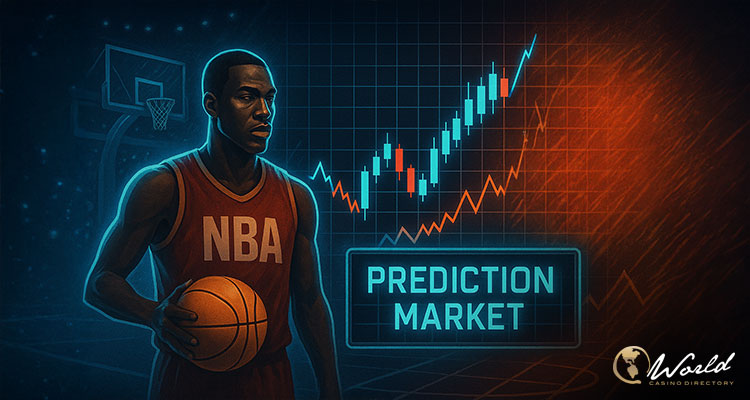Over the past several months, the National Basketball Association has intensified its scrutiny of sports prediction markets, becoming the second major U.S. league to formally raise concerns with the Commodity Futures Trading Commission (CFTC). In a detailed letter, the NBA urged the federal regulator to impose stricter oversight on exchanges like Kalshi, Robinhood, and Crypto.com, citing significant integrity threats posed by unregulated or lightly regulated contracts tied to sports outcomes.
NBA seeks safeguards amid market growth:
The NBA’s submission to the CFTC highlighted what it called a troubling regulatory gap. The league referred to these new markets as “betting,” in contrast to claims by Kalshi and others that their offerings constitute regulated futures contracts rather than traditional gambling.
Alexandra Roth, the NBA’s Vice President and Assistant General Counsel for Governance and Policy, expressed alarm over the lack of required transparency and oversight. “In the event that the CFTC decides to permit the continued offering of these contracts, we would appreciate an opportunity to further engage with the Commission on specific regulatory provisions that can mitigate the associated integrity risks,” Roth wrote. She added that “leagues have little ability to monitor and understand integrity risks” under the current framework.
The NBA emphasized that exchanges do not have the same obligations as licensed sportsbooks, including notifying leagues of suspicious activity or cooperating with internal investigations. This lack of mandated information sharing, the league argues, could allow unethical behavior to go undetected.
Prediction markets have grown quickly. Kalshi now reports that 78% of its weekend trading volume is sports-related, following its handling of over $500 million during March Madness. Robinhood, which partnered with Kalshi, launched its sports markets earlier this year and now operates across 11 sports.
The NBA is particularly concerned about the speed at which new markets—especially player prop-style contracts—are being introduced via self-certification. This method allows federally regulated exchanges to list contracts without needing pre-approval, unlike state-regulated sportsbooks.
“The way new contracts come to market offers a stark contrast,” Roth noted. “Exchanges can launch new, more exotic sports prediction markets via self-certification… But for legal sports betting operators, affirmative regulatory approval… is required.”
The league warned that markets focusing on injuries, officiating, or player performance are likely just around the corner. Such markets, the NBA says, pose a higher risk of manipulation, especially when player involvement or insider knowledge could influence outcomes.
Integrity scandals add urgency:
Recent betting scandals have heightened the league’s concern. In 2024, Toronto Raptors player Jontay Porter was banned for life after it was revealed he intentionally exited games to benefit “under” prop bets. Federal charges followed. Another player, Terry Rozier, remains under investigation for suspicious betting activity tied to a 2023 game.
Though the NBA didn’t reference Porter directly in its letter, it stressed the critical role integrity monitors played in uncovering these cases. However, according to Roth, such monitoring does not yet exist in prediction markets. “We are not aware of any requirement that either exchanges or brokers report potentially suspicious trades… nor are we aware of any mechanism that would require ongoing information sharing between exchanges and affected leagues,” she wrote.
Despite those concerns, Kalshi has taken steps to address integrity. The firm recently partnered with IC360, an industry leader in integrity monitoring. “We do work with Kalshi, and our integrity monitoring and Prohibet services are live,” confirmed Scott Sadin, co-CEO of IC360, as reported by Sportico. He added that the collaboration aims to support sports integrity through proactive, tech-driven solutions.
The NBA’s intervention comes after a canceled CFTC roundtable meant to address the regulatory future of prediction markets. The sudden cancellation, which lacked explanation, has fueled uncertainty, although the comment portal remains open.
Major League Baseball also submitted a letter in March echoing the NBA’s concerns. The American Gaming Association, along with gaming regulators in five states, has pushed for CFTC-regulated exchanges to face the same licensing burdens and compliance hurdles as sportsbooks.
Meanwhile, courts in Nevada and New Jersey have sided with prediction markets, granting injunctions to Kalshi and Crypto.com as lawsuits play out. These rulings suggest the CFTC could indeed hold jurisdiction under the Commodity Exchange Act—a key contention in the ongoing legal tug-of-war over which body should oversee these new financial-sports hybrids.
Commissioner Adam Silver’s long-standing support for legal sports betting adds another layer to the NBA’s position. In a 2014 New York Times op-ed, Silver argued for legalization, stating it would bring crucial oversight to an industry operating in the shadows. Now, a decade later, the league is once again pushing for clarity and accountability—but this time from a federal regulator rather than the states.


